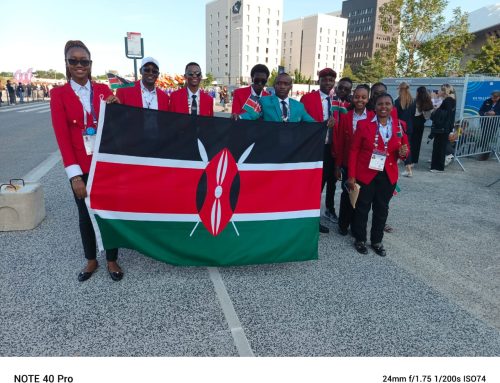Six TVET institutions are squaring out on day two of the WorldSkills Kenya Mechatronics pilot competition taking place at Dedan Kimathi University of Technology after seven others bowed out yesterday after a gruelling day-long battle to remain in the race.
The competition was officially opened yesterday by TVET Authority Director-General Dr Kipkirui Langat and is expected to continue until Friday when the winners of the pilot will be announced.
Mechatronics engineering revolves around building automated systems for industry using mechanics, electronics, pneumatics, and computer technology.
In yesterday’s event, teams of two students from 10 TVET institutions and 7 Technical universities took part in the first stage of the competition. And when a team of trained judges announced the results late evening, teams from four TVET institutions and three from the Technical universities were edged out on points.
The remaining six TVET institutions were allowed to proceed to the second stage. However, the remaining four Technical universities were allowed to skip the second round because they exhibited a better understanding of the system.
According to the competition lead expert Prof. Jean Bosco Byiringiro, yesterday’s competition revolved around understanding the general principles of Mechatronics and the general understanding of the controllers used for the competition.
“The competitors were judged on their general understanding of the controllers and understanding about the problem they are supposed to solved during the competition and communication properly that problem to the judges,” Prof. Byiringiro said.
Only the six TVET institutions are taking part in today’s second stage of the competition. Out of the six teams, two will be eliminated while four will proceed to stage three to square it out with the four teams from Technical universities.
“Today (day two) the six TVET institutions will be expected to show their understanding about the problem they are expected to solve and attempt to solve that problem by upgrading the system. The four teams from the Technical universities will not take part in this stage because they demonstrated this yesterday,” he said.
“The teams from TVET institutions are expected to upgrade the controller system from the 300 Series they were using yesterday to 1,200 Series and program it to carry out specified tasks,” he added.
Mechatronics combines skills in mechanics, pneumatics, electronically controlled systems, programming, and robotics and systems development. Mechatronics technicians design, build, maintain and repair automated equipment, and also program equipment control systems.
The more common and visible mechatronics appliances include shop tills (belt and cash register assemblies) and automated bottle machines. Industrial applications include automated production and process lines that include assembly, packaging, filling, labelling, and testing, as well as automated distribution and logistics systems.
Professionals in this area work in a wide range of sectors, including biomedical, automotive, food processing, and high volume manufacturing. The rapid pace of technological innovation and development will drive demand for mechatronics technicians with an increased appetite for more complex automation systems across a wide range of industries.


